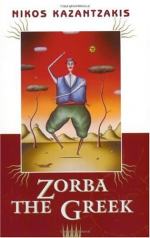|
This section contains 1,086 words (approx. 3 pages at 400 words per page) |

|
Themes
As he does in virtually all of his novels, Kazantzakis uses his story as a means of dramatizing philosophical issues. His characters openly explore the existentialist predicament: man, confronting a meaningless universe, must choose to create ends for himself or drift aimlessly toward a meaningless death.
In Zorba the Greek, Kazantzakis examines this situation through a series of contrasts, established primarily in the characters who populate the story. The narrator, known affectionately as "the Boss," is an ascetic who has sought to escape the harshness of the world by retreating to a study of Buddhism. He is linked through strange coincidence in a business partnership with the flamboyant, excessive, earthy, womanizing jack-of-all-trades Alexis Zorba.
Their contrasting approaches to almost every crisis that confronts them, and their conversations about man's duty toward himself and others, provide Kazantzakis a forum for discussing conflicts of spirit vs. flesh, involvement vs. withdrawal...
|
This section contains 1,086 words (approx. 3 pages at 400 words per page) |

|




